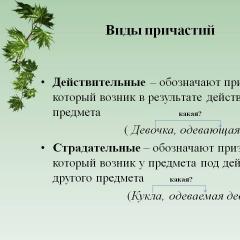Valid and suffering communion
To better understand what the difference between such communations, we turn to the suggestion: " read".
Take the nouns from this proposal as defined words and
we convert verb "Read" in communion.
(what kind?) book.
(What?) children.
Participle ![]() denotes a sign of that subject that himself producedact. That is why such communities are called valid.
denotes a sign of that subject that himself producedact. That is why such communities are called valid.
But the sacrament ![]() denotes a sign of that subject over which someone has made an action. These communities are called praditive.
denotes a sign of that subject over which someone has made an action. These communities are called praditive.
You can always ask a question from persistent communion . For example: "Book read children "," sky, lit Moon. "
And from the actual communities you cannot ask such a question.
Valid communities are the last and present.
The actual communities of the present are formed:
from verbs І Hidness Using suffixes -t /-"
from verbs II Hiding With the help of suffixes - aST / -EP.
hear (ІІ SPR.) - I hear as setiy, breathe (ІІ SPR.) - Hear as setiy.
The actual communities of the present time can only be formed from the verbs of the imperfect.
The actual communities of the past time can be formed from transitional and non-transparent verbs of both perfect and imperfect.
The actual communities of the past time are formed using suffixes
- And- and -sh-.
For example: sell \u200b\u200b- Sell vS.iY, arrive - arr vS.i will bring - led shiy.
If the foundation of the verb, from which the actual communion of the past time is formed, ends on the consonant, then we use suffix -.
For example: - .
If the base of the verb ends with a vowel, then we use suffix -. For example: - , - .
When writing the actual communities of the past time it is important to remember that in front of the suffix of such communals is also stored as in the indefinite form of the verb before -t.
For example: see e.-, cord and-Posse i-.
Paddative communities of the present time are formed from the basis of the current verbs of the imperfect type:
from the verbs of the lumps with the help of suffixes - / -th-
lead - Ved. oh.y, manage - manage eathay;
from the verbs of the II of the lining with a suffix -them-
see - View themoh.
In the formation of persistent communctions of the past time, the type of verb does not matter. These communities can be formed from transient verbs of both perfect and imperfect species.
Paddative communities of the past time are formed using suffixes -n,
-Nela-, -n, -t-.
For example: understand - Effect t.copy - Skeil eNNha
decide - sol yonny, sell - sell nN..
Suffix -N can only join the basis of verbs on "Don't /".
For example: seed yat - , promise aT - .
When using suffix -Nand - The final voice of the verb base is comparted.
For example: - Skel eNNha - Lish. yonnoh.
So, valid and suffering communities have their own characteristics. It is important to remember that in the formation of valid and suffering communion of this time, the choice of vowels in the suffix depends on the rigging of verbs.

Fig. 1. Education of communions ()

Fig. 2. Hindering verbs
Homework
Exercises number 83 - 84. Baranov M.T., Ladyzhenskaya TA and others. Russian. 7th grade. Textbook. 34th ed. - M.: Enlightenment, 2012.
The task: write the phrases with the pieces, mark the souffixes of the communion, determine the pledge of the communals.
1. Wonderful monument. 2. Visening from afar 3. Rose building 4. Protected Cathedral 5. Landored 6. Staying in memory 7. Awesome type 8. Forcing 9. Calculating respect 10. Employed tourists 11. Architectural style 12. Frozen music
Russian language in schemes and tables. Declination of communities.
Didactic materials. Section "Communion"
3. Online store publishing house "Lyceum" ().
Spelling of communities.
4. Online store publishing house "Lyceum" ().
Literature
1. Razumovskaya MM, Lviv S.I. and others. Russian. 7th grade. Textbook. 13th ed. - M.: Drop, 2009.
2. Baranov M.T., Ladyzhenskaya TA. and others. Russian. 7th grade. Textbook. 34th ed. - M.: Enlightenment, 2012.
3. Russian. Practice. 7th grade. Ed. S.N. Pimenova. 19th ed. - M.: Drop, 2012.
4. Lviv S.I., Lvov V.V. Russian language. 7th grade. In the 3rd 8th ed. - M.: Mnemozina, 2012.


